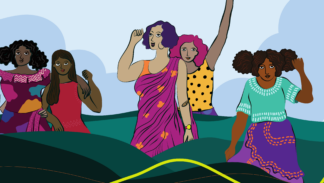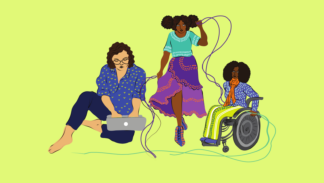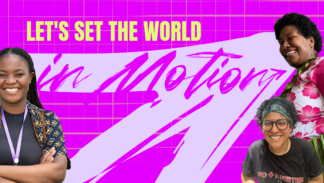Historic abortion ruling in Chile seen as small step for women's movement
At the end of August, Chile’s Constitutional Tribunal voted to legalize abortion under certain circumstances, following Congress’ approval earlier that month. The legislation allows abortion under three cases: when a woman’s life is in danger; when the fetus is not viable; or when the pregnancy is the result of rape. Chile’s new law eases the country’s total ban on abortion, restoring a right women lost nearly three decades ago under military dictatorship.
With this shift, Chile will no longer be considered one of the most restrictive countries in the world in terms of abortion laws—until now, Chile was one of four countries in the Americas that banned abortion under all circumstances; the others are El Salvador, Nicaragua, and the Dominican Republic.
At the heart of this legal victory is Chile’s resilient women’s movement and the many grassroots women’s groups who consider this law to be a critical step towards gender equality. Global Fund for Women spoke with our grantee partners working for safe and legal abortion in Chile about this historic law and what is next in the fight for abortion rights. Our partners remain committed to advocating for legal and free abortion for all women, shattering stigma and breaking the silence around abortion, and improving women’s access to sexual and reproductive health services and rights.
One thing is certain: in Chile, the fight is far from over and women will continue leading the charge until each and every woman and girl has full control over their bodies—no exceptions.
One small step after a long battle
Following the vote by the Constitutional Tribunal on August 21st, the Chilean women’s movement remains divided on the significance of the new law and what the true impact will be for the majority of women throughout the country. Still, Global Fund for Women’s partners see law reform as an important step and believe that legalizing abortion—even for a few legal indications—is better than complete abortion bans.
“It is at least one step. The [small percentage] of women who will fall within the three causes is better than zero,” explains Gloria Leal Suazo, Executive Director of Fundación Instituto de la Mujer, a Global Fund for Women grantee which has been working to empower women and promote gender equality in Chile for 30 years. “As an organization, we want to continue to advocate for the right to safe, legal, and free abortion. Decriminalization is the minimum, we must continue working to normalize the idea that abortion is a right.”
The new law is largely the result of significant work by a coalition of 10 organizations in Chile, including Instituto de la Mujer, lobbying and advocating for it to pass since first proposing the law in January of 2015.
Corporación Humanas, a strong leader in the women’s rights movement in Chile and a Global Fund for Women grantee, also played a key role in this coalition, working with senators and politicians to introduce the agenda to the Parliament and using their collective power and advocacy to influence the reform.
Yet, Corporación Humanas highlights that the bill is very limited and the challenge now is how to extend it. “It is a very restrictive bill, with little room for negotiation in the process,” explains Carolina Carrera Ferrer, the group’s President. “It’s a symbolic step that takes us away from barbarism, but does not solve the problem.”
Other women’s groups in Chile agree. “We support this as a step,” shares Malfada Galdames, Regional Coordinator of Mujeres en Marcha Chile, another Global Fund for Women grantee with deep roots as a feminist movement. “As a movement, we want to demand abortion to be legal and free for all. We want each woman to be able to decide on her body.”
The issue of implementation is one that the women’s movement in Chile will be closely tracking and working toward. For instance, there are concerns that doctors and medical professionals who are against abortion will not follow the standards for implementing the law. Global Fund for Women grantee Línea Aborto Libre, a collective of feminist lesbians working for abortion rights in Chile, recounted that around 500 doctors marched on the streets against the passing of the law and that these doctors are trying to make it their right to not perform an abortion—even under these three circumstances embedded in the new law—as they maintain that it goes against their personal and religious beliefs.
Toward social change and sexual rights
For Galdames and Mujeres en Marcha Chile, the issue of unequal access and treatment for poor women who seek abortions or help with complications from unsafe abortions at public hospitals, compared with women who can afford to pay for private doctors, remains top-of-mind.
“Upper-class women can pay for a private abortion and not be penalized, while on the other hand, poor women are imprisoned or penalized for access to the public health system after an abortion,” says Galdames. “This has to do with the sexual rights of women in general.”
Our partners emphasize the importance of their work making abortion more openly discussed, dispelling myths and rumors, and ending stigma and discrimination. While changing hearts and minds is something that our partners have been working on in Chile for 30 years, social change and growing fundamentalisms remain major obstacles to abortion rights—not only in Chile, but around the world.
“We need to talk more about safe and legal abortion, and take away the stigma and discrimination,” express Ángela Erpel Jara and Carolina Vera from Línea Aborto Libre. “This is a very Catholic country, so abortion is closely linked to guilt.”
Indeed, in Chile, social, political, and religious conservatism remain strong forces against sexual and reproductive health and rights. The New York Times reported that the Roman Catholic conference of bishops in Chile released a statement that last week’s ruling “offends the conscience and common good of our citizens.”
Educating women and raising awareness remains top priority
With this in mind, a key challenge in Chile—as in many other countries globally—is educating women and ensuring they have access to reliable, factual, and complete information about safe and legal abortion. Our grantee partners are using a variety of tactics to reach and educate as many women throughout Chile as possible.
Línea Aborto Libre provides workshops to educate women in various regions, and they operate a hotline to answer questions and talk confidentially with women about abortion. “The workshops are important in addition to the telephone line, because this is face-to-face and takes information to territories where there is no service or internet,” explains Ángela Erpel Jara and Carolina Vera.
Corporación Humanas has a radio program called ‘Políticamente Humanas’ that they record on Sunday mornings. As Carolina Carrera Ferrer explains, “We invite decision makers to talk about reproductive issues and we bring those feminist voices that are not usually heard [in mainstream media].”
Raising awareness within marginalized populations is especially critical when it comes to sexual and reproductive health and rights. “Not all [women] have the information they need—rural women, migrants, rural populations do not have the same access to these reproductive and sexual health services,” emphasizes Gloria Leal Suazo. As a result, Instituto de la Mujer holds trainings and workshops focused on empowering more women to speak out and be vocal activists for safe and legal abortion in their own communities. They help women learn the facts in order to be prepared for debates on television news shows, for instance, and they’re seeing an increase in opinion columns published in media and on social networks in support of safe and legal abortion, written by training participants.
When it comes to the new law, there is no plan or requirement for public education by the government, so the focus on raising awareness about these new conditions is a key focus of Global Fund for Women’s partners. Helping women to understand the three situations when an abortion will now be legal will ensure that women can access these new rights, and—equally important—that those who do not meet the circumstances will not seek an abortion in a public hospital where they could face criminal charges.
Challenges remain, with the backdrop of upcoming elections
For Global Fund for Women’s partners, all eyes are on the presidential elections coming up later this year in November 2017, which could mean additional rollbacks in the fight for safe and legal abortion—and women’s rights more broadly.
“If a right-wing government enters as a result of these elections, there may be a setback,” explains Malfada Galdames from Mujeres en Marcha Chile. “Perhaps it could even further politicize women’s bodies—poor women, migrants, indigenous people [especially], who do not have the necessary resources.”
Beyond politics, Corporación Humanas emphasizes that the lack of resources for the women’s movement working for abortion rights continues to be a major challenge in Chile where conservative campaigns are very well-funded.
Despite the many obstacles, the resilient women’s movement in Chile remains up for the challenge. Malfada Galdames gets right to the point, capturing the commitment and spirit of grassroots women’s groups in Chile to carry forward: “The fight for safe and legal abortion in Chile must and will continue.”
We need to talk more about safe and legal abortion, and take away the stigma and discrimination."Ángela Erpel Jara and Carolina Vera from Línea Aborto Libre


